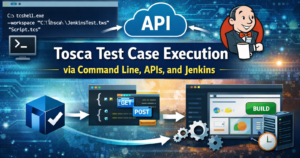In the rapidly evolving world of technology and business, organizations are constantly seeking ways to improve their operations, enhance customer relationships, and gain a competitive edge. One of the most powerful tools that have emerged to meet these demands is Salesforce. This cloud-based customer relationship management (CRM) platform has transformed how businesses interact with their clients, streamline processes, and drive growth. In this blog post, we will explore the intricacies of Salesforce, its features, functionalities, and the myriad of benefits it offers to organizations of all sizes.

What is Salesforce?
Salesforce is a cloud-based software platform designed to help businesses manage customer relationships and streamline operations. Founded in 1999 by Marc Benioff and a group of co-founders, it was one of the first companies to introduce the concept of cloud computing in the CRM space. Since its inception, it has grown into a global leader in CRM solutions, with millions of users across various industries.
The platform offers a comprehensive suite of tools and services that enable organizations to manage their sales, marketing, customer service, and analytics efforts effectively. By centralizing customer data and providing powerful automation features, it empowers businesses to foster deeper relationships with their customers, improve collaboration among teams, and make data-driven decisions.
The Core Components of Salesforce
It is built on a multi-tenant architecture, allowing multiple customers to share the same infrastructure while keeping their data separate and secure. The platform is composed of various components that serve different functions within an organization. Here are some of the core components of Salesforce:
2. Salesforce Sales Cloud
Sales Cloud is designed to help sales teams manage their leads, opportunities, and customer accounts more effectively. Key features of Sales Cloud include:
- Lead Management: Capture and track leads from various sources, including web forms, social media, and email campaigns.
- Opportunity Management: Manage the sales pipeline by tracking deals, forecasting revenue, and analyzing win rates.
- Account Management: Maintain a comprehensive view of customer accounts, including contact information, communication history, and related opportunities.
- Sales Automation: Automate routine tasks such as sending follow-up emails, assigning leads, and generating reports to improve sales productivity.
Salesforce Service Cloud
Service Cloud focuses on improving customer service and support by providing tools to manage customer inquiries and resolve issues efficiently. Key features include:
- Case Management: Track and resolve customer issues by creating and managing support cases, assigning them to agents, and monitoring resolution times.
- Knowledge Base: Create a repository of articles, FAQs, and troubleshooting guides to empower customers and support agents with self-service options.
- Omni-Channel Support: Provide support through multiple channels, including phone, email, chat, and social media, ensuring a seamless customer experience.
- Service Analytics: Analyze customer interactions, case resolution times, and agent performance to identify areas for improvement and optimize service delivery.
Salesforce Marketing Cloud
Salesforce Marketing Cloud helps organizations manage their marketing campaigns, automate marketing processes, and engage customers through personalized communications. Key features include:
- Email Marketing: Design and execute targeted email campaigns to nurture leads and drive engagement.
- Social Media Management: Monitor and manage social media interactions, schedule posts, and analyze social media performance.
- Customer Journey Mapping: Create tailored customer journeys based on individual behaviors, preferences, and interactions to deliver relevant content at the right time.
- Marketing Automation: Automate repetitive marketing tasks, such as lead scoring, nurturing, and follow-ups, to increase efficiency.
Salesforce Community Cloud
Community Cloud enables businesses to create online communities for customers, partners, and employees to collaborate and share information. Key features include:
- Customer Communities: Provide customers with a platform to ask questions, share experiences, and access resources, fostering a sense of community.
- Partner Portals: Create secure spaces for partners to collaborate on projects, share information, and access sales resources.
- Employee Communities: Facilitate communication and collaboration among employees through internal forums, knowledge sharing, and social networking features.
Salesforce Analytics Cloud
Analytics Cloud, also known as Tableau CRM, provides powerful data visualization and reporting capabilities, enabling organizations to make informed decisions based on their data. Key features include:
- Custom Dashboards: Create interactive dashboards that visualize key performance indicators (KPIs) and metrics relevant to your business.
- Data Integration: Connect and analyze data from various sources, including Salesforce data and external databases, to gain a comprehensive view of performance.
- Predictive Analytics: Utilize machine learning algorithms to forecast trends, identify opportunities, and make data-driven decisions.
Salesforce AppExchange
AppExchange is a marketplace for third-party applications and integrations. Businesses can find and install various apps that extend the functionality of Salesforce, allowing for customization to meet specific needs. This includes:
- Industry-Specific Solutions: Explore tailored applications designed for various industries, such as healthcare, finance, and retail.
- Integrations: Connect Salesforce with other business applications, such as ERP systems, project management tools, and collaboration platforms.
- Custom Apps: Develop and deploy custom applications to address unique business challenges or requirements.
Benefits of Using Salesforce
The adoption of Salesforce can provide numerous advantages to organizations across different sectors. Here are some of the key benefits:
Improved Customer Relationships
By centralizing customer data, it enables businesses to gain a holistic view of their customers, including their preferences, interactions, and purchase history. This information allows organizations to tailor their communications, enhance customer experiences, and foster long-lasting relationships.
Increased Sales Efficiency
Salesforce’s automation features help streamline sales processes, reducing administrative burdens and allowing sales teams to focus on what matters most—closing deals. Automated lead scoring, follow-up reminders, and task assignments improve productivity and boost overall sales performance.
Enhanced Collaboration
Salesforce promotes collaboration among teams by providing a unified platform where users can share information, communicate, and work together on projects. Features such as Chatter (a social collaboration tool) enable real-time discussions and knowledge sharing, improving teamwork and accountability.
Data-Driven Decision Making
With Salesforce’s robust analytics and reporting capabilities, organizations can make informed decisions based on data. Custom dashboards and reports allow leaders to track performance metrics, identify trends, and adjust strategies accordingly, fostering a culture of continuous improvement.
Scalability and Flexibility
As a cloud-based solution, Salesforce is highly scalable and can grow with your business. Organizations can easily add new users, features, and functionalities as needed, ensuring that the platform remains aligned with evolving business requirements.
Accessibility
Being a cloud-based platform, Salesforce can be accessed from anywhere with an internet connection, allowing teams to work remotely and stay connected. This flexibility is particularly beneficial for organizations with distributed teams or employees who need to access data on the go.
Continuous Innovation
It is committed to continuous improvement and innovation. Regular updates and enhancements ensure that users benefit from the latest features, security measures, and best practices. This commitment helps organizations stay ahead of the curve in an ever-evolving business landscape.
Getting Started with Salesforce
For those interested in harnessing the power of Salesforce, getting started is straightforward. Here are some steps to help you on your journey:
Define Your Objectives
Before diving into Salesforce, it’s essential to define your objectives. Determine what you want to achieve with the platform, whether it’s improving customer relationships, streamlining sales processes, or enhancing marketing efforts. Clear goals will guide your implementation strategy.
Choose the Right Edition
Salesforce offers various editions tailored to different business needs, including Essentials, Professional, Enterprise, and Unlimited. Evaluate your organization’s requirements and budget to choose the edition that best aligns with your objectives.
Invest in Training and Certification
To maximize the benefits of Salesforce, invest in training for your team. It offers numerous resources, including online courses, webinars, and certification programs. Ensuring that your staff is well-equipped with the knowledge and skills needed to use the platform effectively is crucial for successful implementation.
Customize the Platform
Salesforce is highly customizable, allowing organizations to tailor the platform to their specific needs. Work with your team to configure the system, create custom fields, and set up workflows that align with your business processes.
Integrate with Other Tools
To enhance the functionality of Salesforce, consider integrating it with other business applications your organization uses. This may include marketing automation tools, project management software, and ERP systems. Integrations can streamline processes and improve overall efficiency.
Monitor Performance
After implementation, continuously monitor performance metrics and user feedback. Regularly assess how well the platform is meeting your objectives and make adjustments as needed. Utilize Salesforce’s reporting capabilities to track KPIs and identify areas for improvement.
Engage with the Community
Join the community to connect with other users, share experiences, and gain insights. Participate in forums, attend user group meetings, and explore resources on platforms to stay informed about best practices and industry trends.
Conclusion
Salesforce has revolutionized the way organizations manage customer relationships and drive business growth. With its robust suite of tools and features, it empowers businesses to enhance customer engagement, improve collaboration, and make data-driven decisions. Whether you are a small startup or a large enterprise, it offers solutions that can be tailored to your unique needs.
As the landscape of business continues to evolve, leveraging a powerful CRM platform like Salesforce is essential for staying competitive. By embracing the capabilities of Salesforce, organizations can not only improve their operations but also foster lasting relationships with their customers, ultimately paving the way for long-term success.



























